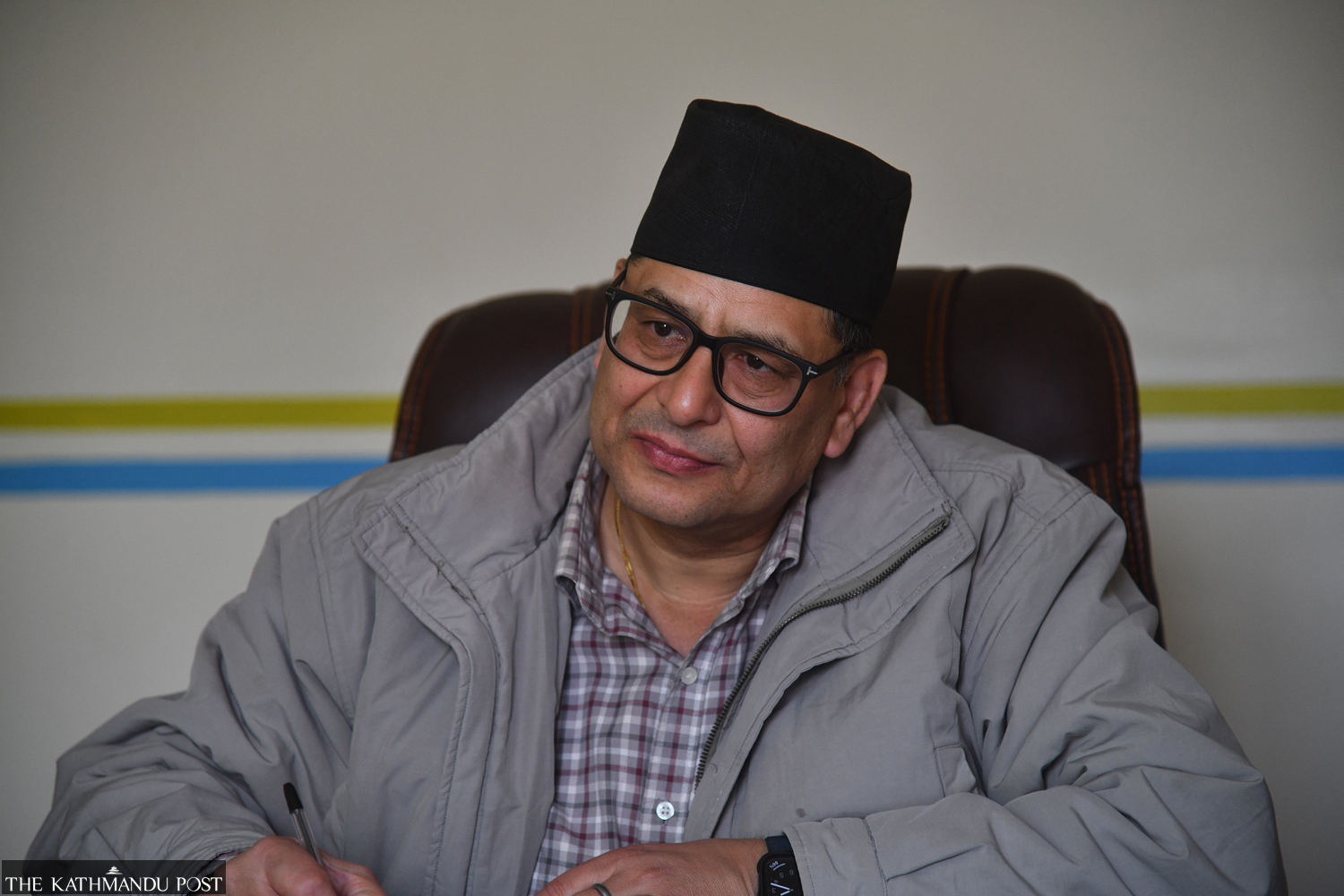Interviews
Centre should have a reserve force for contingencies
The police adjustment process should be handled more cautiously as police personnel work with arms and ammunition.
Thira Lal Bhusal
Prime Minister Pushpa Kamal Dahal on January 17 directed the home minister and other officials concerned to complete the police adjustment process within two weeks. Dahal set the deadline after chief ministers from all seven provinces continuously pressed him to quickly work towards adjusting the police forces in the provinces. Post’s Thira Lal Bhusal talked to former government secretary Jaya Mukunda Khanal, who for long also worked as chief of the security and coordination division of the home ministry.
What do you make of the prime minister’s directive on police adjustment? Is it possible within such a short deadline?
This should have been done long ago. But two weeks is insufficient to settle the issues given the sensitivity of the matter. It all depends on the preparations. I see a lot of things still need to be done. We are still guided by the Police Act, 1955. There are many grievances over the provisions of the Act with regard to transfer, promotion, perks and facilities of police personnel. These issues are yet to be resolved. I don’t think there has been sufficient preparation for police adjustment in provinces. As the prime minister has already directed the authorities to do it by January-end, we have to see how it moves ahead.
The provinces have not had their own police forces even though it has been over eight years since the constitution provided for the same. That is a long time.
Yes, the constitution clearly states that each province will have their own police force. So the federal government must provide them with such forces. It has definitely been delayed, by years. At present, the provinces don’t have their own police recruitment mechanisms and resources. So, the centre should send the forces from Kathmandu based on the interest of the personnel. The process should be expedited.
What are the things that should be taken into consideration during the police adjustment process?
While adjusting civil servants in the provinces, the federal government offered promotion or salary increment to encourage them to go to the provinces. Similar modality can be applied while sending police personnel to the provinces. But the police adjustment process should be handled more cautiously as police personnel work with arms and ammunition. Botched mobilisation of the force can be counter-productive. The decision makers should be careful while deciding on the force commanders, the agencies that monitor the commanders and the leadership that mobilises the commanders. The other concern is maintaining the quality and competence of the force in the provinces. If promising police officers, who aspire to be top officials and even lead the force at the central level, don’t want to go to provinces and if less competent personnel are sent, the efficiency of the provincial forces will be compromised.
A large number of police officials are reportedly reluctant to join provincial forces as police personnel working in a province can be promoted only up to the rank of Superintendent of Police (SP). Their reluctance has emerged as a big challenge in initiating this process. How should it be addressed?
The government should encourage even outstanding officials to join provincial forces by giving a message that their climb up the ladder will be faster in that case. Likewise, there should be a provision ensuring that police personnel recruited by the provinces will be allowed to reach top positions in the federal police force. If that provision is included while forming provincial police forces, promising youths will be attracted to the provinces as well.
Should there be quotas in each province to enter the federal police force?
There must be a provision to ensure that a certain number of police personnel will be allowed to enter the federal police force. Otherwise, there will be no attraction in the provincial forces. Certain quotas should be allocated for each province and specific criteria must be defined for promotion. And these provisions should be clearly stated in the Police Act. There shouldn’t be provisions like, “it shall be as stated in the regulations”. Such provisions will give space for certain leaders or officials to misuse them for their interest. The Act should clearly define the criteria on recruitment, promotion and transfer.
The Public Service Commission should have a greater role in the process. Otherwise, the police personnel will be compelled to appease leaders and that will eventually ruin the organisation. Reservations of quotas for provinces will encourage promising youths to join provincial forces as they can dream of reaching top positions of the federal police as well. Otherwise, the provincial forces will be inefficient and invite problems.

There is a concern that the provisions of the 2019 Act may invite duplication of command as the centre deputes a deputy inspector general (DIG) of Police as chief of the force to each province to work under the federal home ministry, while the provincial forces have to work under provincial governments. What if the DIG’s directive and provincial home administration’s instruction contradict?
DIGs should be deputed to each province in order to ensure good coordination between the police leadership of the provinces and the federal home ministry. It is vital to tackle big criminal issues and challenges related to law and order and also to resolve inter-provincial problems. In the meantime, we should simultaneously work to ensure that new recruits in the provinces will be trained and oriented as per the same spirit, values and principles. Otherwise, there can even be a mutiny. The DIGs to be deputed from the centre should be able to inculcate that spirit in the newly recruited rank and file and also work as their guardians.
Such is also the case of the Chief District Officers (CDOs), who are under the home ministry but have to mobilise security personnel there.
The CDOs should have good working relations with the provincial government while constantly receiving policy directions from the federal home ministry. This will be crucial in the future because there will be lots of civil servants recruited by provinces. Therefore, CDOs and DIGs to be deployed in the provinces should be efficient in coordination between the home ministry, provinces and districts. Coordination role of these officials is going to be more crucial.
What kind of differences in policing will we see when the provinces have their own police forces?
The provinces should have their own police forces. This is a basic feature of federalism. Each province has unique social realities, problems and prospects. The people, officials and police personnel deployed there can better understand ground realities. So, crime investigation and dispute resolution can be more effective. Language and even costumes used by officials can create a positive impression. But, at the same time, some serious criminal cases may not be properly handled locally. Such cases should be handled by the centre. For that, there should be a strong back up force at the centre. For instance, if a provincial force cannot investigate and control a serious case and violence flares up in the province, who will handle the fallout? Centre should be prepared to take the situation under control, not other provinces. There should be a reserve force for contingencies. They should be competent in special purposes such as crime investigation, riot control and disaster management.
Won’t that further increase the size of our police force?
It will definitely increase the total size as well as expenses. The presence of a reserve force at the centre, however, will build pressure on provincial forces as the central force will intervene in their affairs if they fail to handle a situation or resolve a case.
What if a province claims that they are competent to handle a certain case when the centre wants to intervene?
For that, the police adjustment Act has envisioned a police coordination committee chaired by the federal home minister. Interior affairs ministers of all the provinces, among other officials, are ex-officio members of the body. They will assess the situation and make decisions.
We often see tussles between federal and provincial levels on various issues. What if there are similar tussles on police mobilisation?
That will be more serious as the police is a force that holds arms and ammunition. If a political leader or a senior official tried to use that force for certain vested interest, that may invite grave consequences. So, this issue should be dealt with extra caution.
You also served as a secretary at the Ministry of Defence. Will police adjustment make any difference in terms of the country’s defence and national security?
Police are the front force in crime investigation and maintaining law and order. They are in direct contact with the public. If the police force works effectively, defence becomes easier. We don’t deploy the army along the border. If the provincial police forces give information and inputs about border activities to the Nepal Army and Armed Police Force, it becomes easier for the latter. Some of our national security policies and strategies are formulated based on information given by Nepal Police and National Investigation Department. In the future, the information and cooperation of the provincial forces will be vital in this connection.
Some see more chances of politicisation in police forces after the adjustment. What do you think?
The Police Act, 1955 helped politicisation with vague provisions like promotions and transfers will be “as stated in the regulations”. The APF is less politicised as the APF Act itself has clear provisions. Therefore, this occasion should be used to stop politicisation in provincial forces by making everything clear in the act itself. And, it should state that the promotions and transfers shall be done strictly as per the act. Then the police will stop appeasing politicians.




 13.12°C Kathmandu
13.12°C Kathmandu




.jpg&w=200&height=120)







